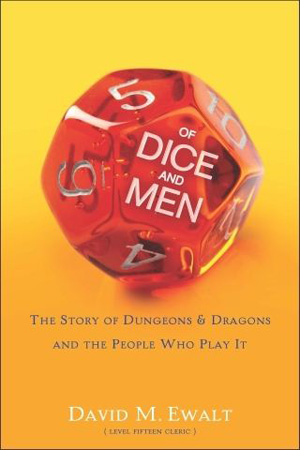Dice Dice, Baby
Of Dice and Men: The Story of Dungeons & Dragons and the People Who Play It by David M. Ewalt
It’s a nice time to be a fan of pen-and-paper roleplaying games.
Granted, there aren’t quite as many games out there as I’d prefer. Too many great games are basically out-of-print, sustained only by online PDF sales. I can find more RPGs at the local used bookstore than I can at any other store selling games. There are a lot of my favorite games that I haven’t bought any new material for in years — either they aren’t selling, they aren’t producing anything particularly good, or they’re selling stuff on the down-low. The comic shops I go to sell some games, but not as many as the great game stores of the past used to. They have D&D and Pathfinder and Munchkin and board games — but no GURPS, no Call of Cthulhu, no Mutants and Masterminds, none of the greats. Heck, you gotta go a far piece just to find a store specializing in roleplaying games.
But it’s still a good time to be a gamer, because RPGs are having a minor renaissance, thanks to a combination of gamer nostalgia and more people realizing it’s fun to get together and play games.
So here’s David Ewalt (billed on the cover as a Level 15 cleric) and this cool book he wrote, essentially a bit of pop-sociology, examining the history of Dungeons & Dragons, and the culture of D&D players. Most of this information is not new — many hardcore gamers have known and memorized the history of how Gary Gygax and Dave Arneson created D&D, but it is very nice to have the story recorded in a nice mass-marketed book designed to appeal to gamers and non-gamers alike.
So we start in the ’70s wargaming scene, with Gygax and Arneson both adding interesting elements that moved gaming away from mass combats to a focus on individual characters — something that either freaked the grognards out or completely thrilled them. Gygax and Arneson had conflicting philosophies and styles that nevertheless merged neatly — if only temporarily — to create roleplaying’s greatest success. And for many years, times were very, very good — but good times never last forever, even if D&D might.
Scattered throughout the historical narrative are short profiles of regular gamers — some of them friends of the author, some of them just people he met while researching the book. We also visit a unique LARPing weekend event, watch the initial stages of the development of the new edition of D&D, get a short pilgrimage around the holy sites of the game’s creation, and much more.
Verdict: Thumbs up. There is so very much here that I never knew. Not just how Gygax and Arneson created the game, but how it was funded, how it was often not funded, how TSR came about, all the lawsuits that flew all around during the early years, how GenCon slowly grew.
And the whole thing never gets dry or boring or weighted down by historical facts. There’s tons of humor, winking nods to gamers’ obsessions and to the minutiae of D&D’s rules. We get to meet a ton of interesting people, watch them create their characters, play their games, and tell their stories, both in-game and in real life.
It has a few failings. Some of the darker periods of the game’s history, particularly the reign of RPG-hating Lorraine Williams at TSR, are given short shrift. And almost the entire focus of the book is on Dungeons & Dragons. Very few other RPGs are even mentioned. Magic: The Gathering is discussed a little, mostly because Wizards of the Coast ended up buying D&D.
For the most part, that’s okay — it’s a book about Dungeons & Dragons, not about every other RPG out there. But there were some points where other RPGs should’ve been mentioned — when the discussion is about how much people liked D&D version 3.5 and how many disliked version 4, it might be worth mentioning that Pathfinder was basically created as a way for gamers to keep playing 3.5, and that it ended up dethroning D&D as the most popular RPG as a result.
Still, those are mere quibbles. On the whole, it’s an outstanding book, well worth reading for anyone who grew up playing D&D and wishes they could return to the hobby. Go pick it up, read it, pass it along to your friends and family, if you think you can trust ’em to give it back. Hopefully, you’ll be able to expand your gaming group to a few more people.
Comments off

